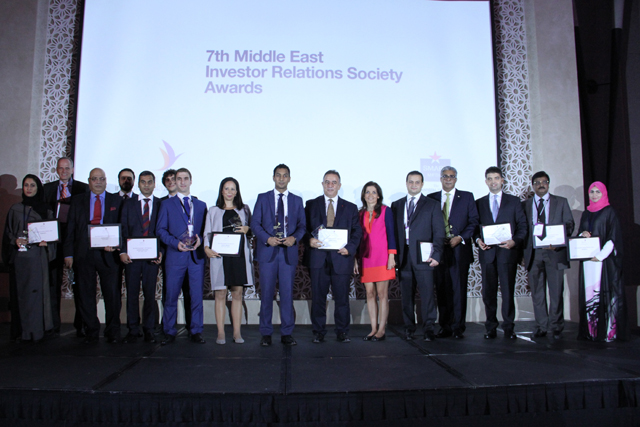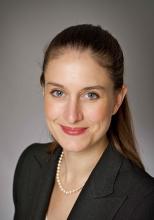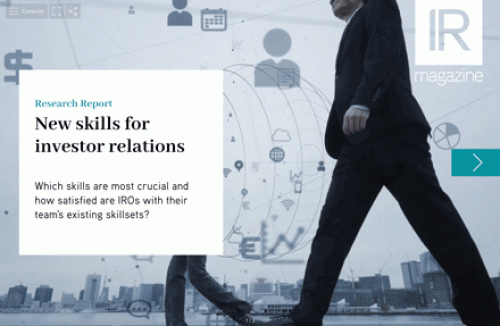Middle East IR Society conference discusses post-reclassification fund flows, the importance of local investors and the opening up of the Tadawul
What better excuse to flee London’s dreary September weather than an invitation to attend the Middle East Investor Relations Society’s (MEIRS) annual conference and awards in Dubai? The event, in its seventh year ‒ and ‘the best one to date’, according to several delegates ‒ has indeed enjoyed a boost under the impulse of the association's resourceful new general manager Clemence Piot. More than 250 attendees, including IROs from the UAE, Qatar, Egypt, Lebanon, Oman and Saudi Arabia, gathered at downtown hotel The Address to network, discuss best practice improvement and celebrate the region’s top IR performers.
‘This year's edition is a key milestone for our annual conference and awards,’ Piot enthuses. ‘With an unprecedented diversity in speakers and topics, the conference is no longer just an educational platform but a place to analyze capital market developments in the Middle East and their impact on IROs. The fantastic turnout reflects the conference committee’s success in getting ever closer to our members' needs.’
After a keynote speech by First Gulf Bank’s CFO Karim Karoui, the conference kicked off with a best practice panel discussion on corporate reporting trends in the region. Lisa Williams, head of IR advisory at Citi’s depositary receipts division, highlighted that a good annual report is a vital part of an efficient IR program, which can ultimately help reduce the cost of capital. ‘There is a very strong culture of privacy in the region, where the mostly family-owned firms are reluctant to disclose publicly,’ said Imelda Dunlop, executive director of the Pearl Initiative, a UN-backed program advocating transparency and accountability in the Arab world.
Things have been evolving ‒ albeit slowly ‒ and with the recently increasing focus on attracting foreign investment, companies have started to consider the importance of governance and shareholder value, and reports have been more forward-looking. ESG issues have yet to be addressed, however, with less than a quarter of the 100 largest firms in the UAE producing some kind of corporate responsibility report. ‘Although it improves strategic decision-making in business, integrated reporting won’t be happening in Gulf Co-operation Council countries for a while,’ Dunlop noted with regret.
The importance of a strong regulatory body in building market confidence was highlighted in the next session on governance developments. ‘You need to follow international standards to attract international listings,’ said Azza Abdel-Bari from Dubai Financial Services Authority, citing the body’s 93 bilateral memoranda of understanding signed with foreign regulators. Dubai Financial Market’s Fahima Al Bastaki explained that the UAE’s new company law requires disclosure not only from public firms but also from private ones. Listed companies, especially second-tier, less-liquid ones, should work on building a compelling equity story to attract analyst coverage, reminded moderator Alex MacDonald-Vitale, head of IR for the Middle East and North Africa at HSBC.
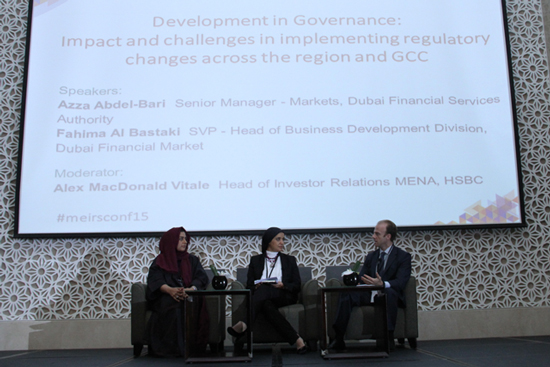
‘In a market where 70 percent of shareholders are individual ones, you need to make sure you work with local brokers that have the right retail connections,’ stressed Chris Wilson, head of IR at Aldar Properties, in a case study on targeting local investors. To reach out to ultra-high-net-worth (UHNW) individuals and family office representatives, IROs should develop shorter, more concise presentations and conduct local-only retail investor events on top of traditional roadshows. Drafting proper Arabic content instead of relying on translations from English is vital, he added.
The inclusion of the UAE and Qatar in the MSCI Emerging Markets Index has yet to have a significant impact on institutional ownership and liquidity, revealed a panel discussing fund flows one year after the reclassification. ‘Passive funds are a source of positive performance but also of volatility,’ said Simon Kitchen from EFG Hermes. ‘More active investors will be attracted as both countries see their respective weight reach 1 percent of the benchmark, and institutionalization will bring more stability to the market.’
There is a positive correlation between an increase in foreign ownership limits and both the stock price and institutional inflows, stressed Adel Merheb from SHUAA Capital. ‘Companies attracting international money have the transparency and disclosure standards of international firms,’ added Andreas Posavac from Ipreo, also noting that UAE firms are better versed than Qatari ones on these issues.
Mahmoud Salem from BNY Mellon Depositary Receipts presented the key takeaways from the firm’s IR survey. A majority of IROs in the region cite increasing international ownership, analyst coverage and stock liquidity as their priority objectives, but with an average team size of 2.4 people and an annual budget of $300,000, department heads must work with fewer resources than their western counterparts. Sixty percent of respondents reportedly use brokers for non-deal roadshows and ‒ surprisingly ‒ Amsterdam scores a joint fourth position in the list of most-visited cities.
After a sampling of local delicacies during the lunch break, delegates listened to Omar Darwazah from Orascom Construction Industries, who explained the advantages of a subsidiary listing, which should lead to a higher valuation for the parent company. A panel of buy-side representatives then debated what they expected from company meetings. ‘Meeting senior management is a must in our investment-making process,’ declared Franklin Templeton’s Bassel Khatoun. It was revealed that while 90 percent of firms in the UAE have some kind of interaction with investors and analysts, only 75 percent actually have a dedicated IRO handling those relationships.
Sebastien Henin from The National Investor stressed that his Abu Dhabi-based firm focuses mainly on ‘small and mid-caps with a clear strategy that are lacking coverage and are therefore mispriced’ ‒ a slight portion of the market where the 100 largest UAE companies make up 75 percent of the total capitalization. Management at those target firms should therefore be more approachable and more proactive in their corporate storytelling, Henin said.
The small and mid-cap theme continued during the session dedicated to the latest developments on the Tadawul, Saudi Arabia’s stock market, which opened to foreign investors three months ago. One panelist pointed out that the country has a wealth of small and mid-sized firms ‘in need of capital’ that are ‘starting to make a bigger effort’ to reach out to investors: family offices and UHNW individuals, which own a whopping 90 percent of the market, are usually investing with a long view and are interested in the same form of disclosure as institutional investors. The increase in fines imposed by the local regulator was also highlighted. ‘This means the exchange is doing a better job,’ said Andrew Tarbuck from Latham & Watkins. ‘Proper enforcement will give confidence to qualified foreign investors (QFIs).’
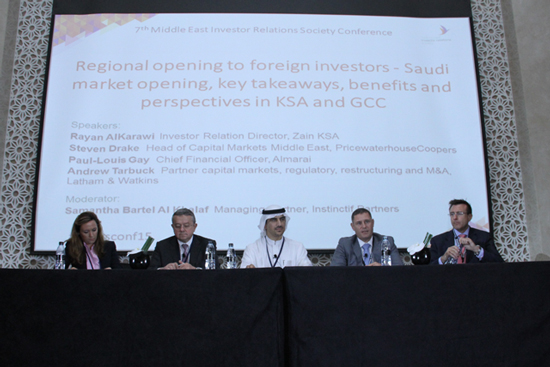
A strong regulator is needed during this period of transition, agreed Steven Drake from PwC. Noting that the expected ‘floodgate opening’ hadn’t taken place and that the stock market had lost 20 percent since June, Drake pointed to the lengthy process for QFIs, ‘which need to approve their clients on case-by-case basis.’ The Saudi exchange has always been quite active in bringing new companies to the market and there are bound to be more listings in the pipeline, as family businesses facing a succession issue often resort to an IPO, he added. Paul-Louis Gay, Almarai’s CFO, highlighted that the exchange is working on establishing ‘a true professional debt market’, as well as setting up ‒ among other things ‒ a real estate investment trust mechanism, a mutual fund distribution platform and an OTC marketplace.
In response to the lack-luster investor interest since the market’s opening up, a group of Tadawul-listed firms have decided to join forces by organizing a common roadshow to the main financial centers in the upcoming months, revealed Ryan Al-Karawi from Zain KSA. ‘Better late than never!’ he joked. Moderator Samantha Bartel Al Khalaf from Instinctif Partners concluded the session by offering more food for thought: ‘Will the Tadawul become the biggest financial hub in the Middle East, and what impact will the potential inclusion of Saudi Arabia have on the emerging markets benchmark?’
A session on regional macroeconomics saw Robinder Singh, director of IR and external affairs at Dana Gas, express the value of ‘being conservative in your quality of communications’ during an economic downturn. ‘Focus your pitch on delivering on operations, balance sheet strength and quality of management,’ he declared. The Sharjah-based IRO, who meets with 400 investors on average annually, has noticed increased interest from value and opportunistic funds.
Arabic media play a critical role in a market dominated by retail investors, reminded Riad Hamade from Bloomberg. Khatija Haque, head of MENA research at Emirates NBD, stressed that in the absence of regular official government data, such as the Purchasing Managers’ Indices for the region, it is always appreciated when IROs are able to provide information on ‘the broader environment in their sector’.
Delegates then enjoyed a short break, with some taking a dip in the hotel’s pool and others heading to the adjacent gigantic Dubai Mall, before sitting down for the awards dinner. This year’s grand prix went to Dubai-listed port operator DP World, which also snatched the accolade for best annual report, best corporate for IR in the UAE, and best IR by a CEO for its chief executive Mohammed Sharaf. Qatari telecoms firm Ooredoo, which led the nominations with eight short lists, won the awards for best corporate for investor relations and best IR professional in Qatar, while SHUAA Capital claimed the prize for best IR website.
‘We are delighted to congratulate the winners of the IR awards, which continue to be a healthy measure of best practice in IR and testament to the positive progress achieved in the region,’ said MEIRS chairman Oliver Schutzmann.
